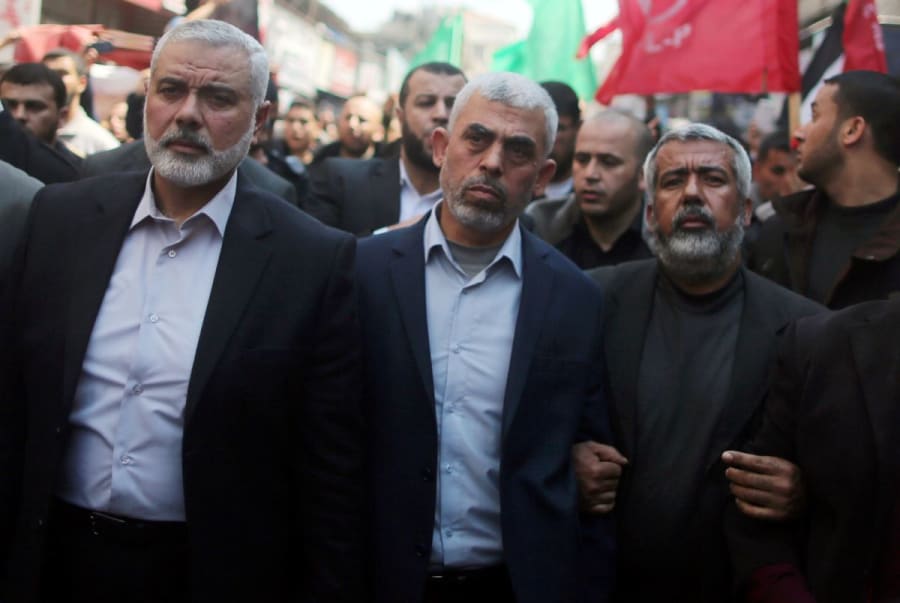Hamas showing ‘flexibility’ in hostage deal negotiations, Israel cautiously optimistic
Israeli delegation could leave for Cairo to rejoin talks in coming days

The terror organization Hamas has indicated some ‘flexibility’ in the talks about a new hostage release deal, giving rise to cautious optimism about the prospects of the stalled talks, Israeli officials told Channel 13 news on Tuesday.
“If there is progress with the mediators in the talks taking place in Egypt, an Israeli delegation will go to Cairo in the coming days,” the officials said, according to the report.
On Wednesday, Egyptian and Qatari mediators told Israel that Hamas negotiators were slowly shifting their positions, potentially allowing Israel to send representatives to continue the talks.
A senior Hamas delegation traveled to Cairo on Tuesday to continue the negotiations, while Brett McGurk, U.S. President Biden's top Middle East adviser, was in Cairo on Wednesday to speak with the director of the Egyptian intelligence service, Abbas Kamel.
On Friday, CIA director Bill Burns is expected to travel to Paris to meet with Qatari, Egyptian and Israeli officials to advance the negotiations.
Prime Minister Benjamin Netanyahu came under criticism last week after deciding not to send another delegation to Cairo.
His office explained in a statement that “Israel did not receive in Cairo any new proposal of Hamas on the release of our hostages… A change in Hamas’s positions will allow the negotiations to advance.”
A decision on Israeli representation in the talks will be made after the talks with senior Hamas officials in Cairo are concluded, Channel 13 reported.
Hamas has come under increasing pressure to drop its “delusional” demands in the negotiations, including from the Lebanese terror group Hezbollah, said Arab Affairs Editor Jacky Hugi on Army Radio on Wednesday.
“Hamas is under pressure from home and abroad: one of them is Hezbollah,” he continued.
“In recent weeks, Nasrallah and his men have asked Hamas to consolidate and claimed that their demand to release hundreds of prisoners with blood on their hands is unrealistic, and Israel would not be able to comply with it even if it really wanted to.”
Hezbollah feels it has achieved a lot in four months of fighting but is close to exhausting this round, and therefore would prefer the war in Gaza to come to an end in order to be able to cease its attacks on Israel without losing face, Hugi explained.
“Everything that happens from here on is already dangerous for them; they caused Israel to evacuate the population, took a toll on human lives, attacked bases, and tied forces to the northern border. All of these are achievements for them, but they are satisfied with them, and they said to [Hamas’ leader] Haniyeh that his approach ‘is not realistic; you need to be flexible’,” Hugi said.
Unlike Netanyahu’s decision not to send a delegation last week, war cabinet ministers Benny Gantz and Gadi Eisenkot are said to be intimately involved in the decision-making process this time.
Gantz talked about the renewed negotiations on Wednesday, saying, “There are attempts these days to advance a new outline, and initial signs point to the possibility of moving forward.”
“We will not stop looking for the way, and we will not miss any opportunity to bring the girls and boys home,” he added.
A government source told Ynet News, “If Hamas continues to harden its positions and we do not see a significant change in its positions, we will not go to Paris. There is no travel and no summit with Israeli participation without Hamas moving. If we get a bad answer, we won’t go.”
In recent days, Gantz has repeatedly stated that if there is no deal, the IDF will enter Rafah – even during the period of the Muslim Ramadan fast

The All Israel News Staff is a team of journalists in Israel.













